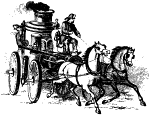River of bumps.
Dear Word Detective: On a recent visit to Savannah, GA, my wife asked me about the smooth cobblestones on the streets in the historic River District. When she asked me about the origin of the word “cobblestone,” I did not know. Can you help? — Wayne Bollinger.
 Clippity-clop, clippity-clop, clippity-clop. There, I finally found an excuse to do my horse-on-a-cobblestone-street imitation (although it’s really much more impressive in person). Now if I can just work the screech of a red-tailed hawk into one of these columns, my life will be complete. You’d never guess that my childhood hero was Gerald McBoing-Boing, would you?
Clippity-clop, clippity-clop, clippity-clop. There, I finally found an excuse to do my horse-on-a-cobblestone-street imitation (although it’s really much more impressive in person). Now if I can just work the screech of a red-tailed hawk into one of these columns, my life will be complete. You’d never guess that my childhood hero was Gerald McBoing-Boing, would you?
Cobblestones are cool. For those poor souls who have spent their lives trapped in the asphalt wastelands of suburbia, I should explain that “cobblestones” are small (usually six inches or less across) rounded stones set in sand or mortar, a method of paving streets common from the late Middle Ages into the 18th century. Long since replaced with asphalt and similar “smooth” (i.e., boring) sorts of pavement in most places, cobblestone streets still exist, frequently preserved in “historic” sections of cities. When last I checked, there were still several cobblestone streets in New York City’s Soho neighborhood, for instance. If you’ve never heard horses’ hooves on a cobblestone street, you’ve missed one of life’s most evocative sounds.
I have, on occasion, made a few snide jokes about the accuracy (or lack thereof) of the do-it-yourself online encyclopedia Wikipedia. Many parts of Wikipedia, as the curate said of the egg, are quite good. But every so often I come across a real clunker. When Wikipedia announces that “cobblestones” are so called because they are “cobbled (roughly assembled)” to form pavement, they stumble and land face down in the street. The verb “to cobble,” meaning “to join or mend clumsily” (source of the derivative noun “cobbler,” one who repairs shoes or makes simple repairs) has no connection to “cobblestone.” See me after class, Wikipedia.
“Cobblestone” is derived from the very old English word “cob,” which had a wide range of meanings, one of which was “rounded lump” with overtones of large size. The “cob” in “corn-cob” invokes a slightly different sense of “cob,” that of “top” or “head” (which, in some people, is also a large rounded lump, but I digress). “Cobweb,” since you were about to ask, has nothing to do with “cob,” and comes from the Middle English “coppe,” meaning “spider.”
“Cobble,” which appeared in the 15th century, simply added the diminutive suffix “le” to “cob,” and meant a small stone rounded by the flow of water, essentially a large pebble. It was these smooth “cobbles,” gathered from stream beds, that paved the first “cobblestone” streets.




Fantastic explanation and word origin. So vividly described, I can see been large rounded riverstones in my mind’s eye! Thank you very much for your research as well as your informative and entertaining explanation. PB